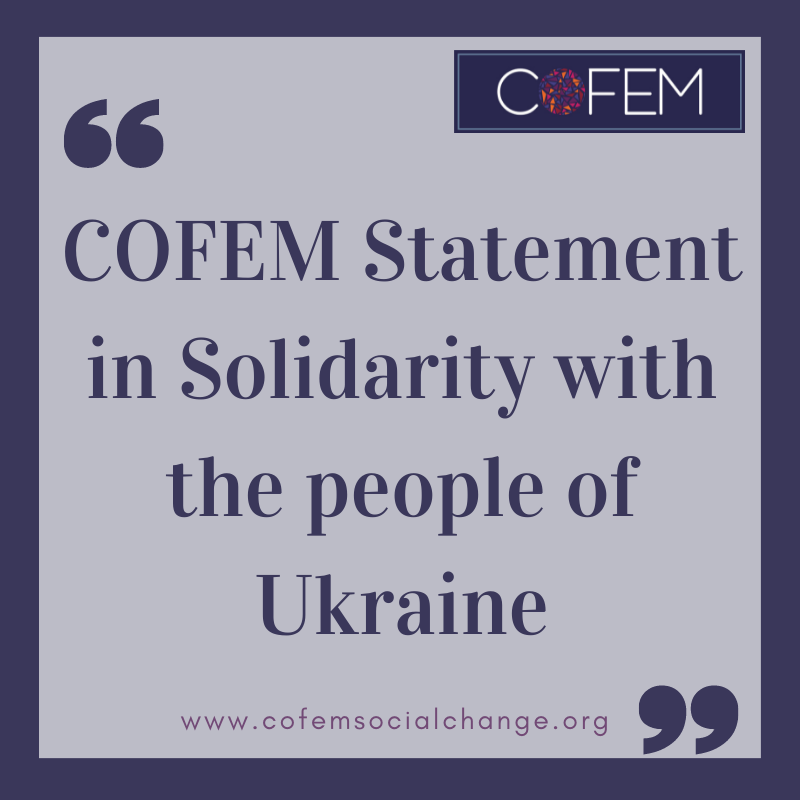The Coalition of Feminists for Social Change stands in solidarity with people in Ukraine. We condemn imperialism and Russian military action, and all Russian military action within Ukraine’s borders that violates basic human rights to safety and sovereignty. We stand in solidarity with the Ukrainian feminist, LGBTQIA+, and disability justice community based organizations who are the first ones to be affected and the first ones to respond to crisis. They are working, as we write, to leverage their long standing community relationships and expertise in inclusive crisis response to evacuate communities and provide life saving services and humanitarian aid. We would like to amplify the work of Ukrainian community based organizations who have been building systems of mutual support since the war first started in 2014.
COFEM recognizes that violence against women and girls increases substantially in situations of conflict and war. We urge the international community to take a feminist approach to monitoring and responding to the crisis; centering the voices and needs of women and girls in all their diversity, and creating pathways to ensure full participation of women and girls throughout humanitarian response processes.
In the midst of war and the humanitarian crisis in Ukraine, it is imperative to respect and value all lives regardless of race, culture and nationality, and to give equal opportunity to safety, security and dignified life. It is important to acknowledge that historically and presently, the pleas of African, Arab and South Asian refugees, students and migrants, seeking refuge from war and an opportunity for a decent life have been ignored; their pain minimized and belittled, and their requests denied due to the structural racism of European Union migration politics. Racism continues to infiltrate societies at pivotal and critical periods when solidarity and action is needed to ensure the preservation of life. The Eurocentric responses from journalists, political commentators, and politicians minimize the impact that racism has on people who do not represent Whiteness. The heroic efforts of BIPOC refugees and migrants demonstrate the depth of their advocacy, bringing forth international outrage and further illustrating the disparities that exist in conflict right in front of our eyes.
We call out racism and Islamophobia in all forms. We call out institutions, countries, and other entities that continue racist migration policies, uphold inequitable border laws, and normalize discriminatory interactions with non-white, non-European people. Structural racism must be uprooted and called out loudly for the dignity and freedom of others. We recognize the generational forms of resiliency that minoritized populations have had to overcome and who continue to strive to realize their rights.
Our struggles are not in silos – our struggles are interconnected and we can all play a role as allies, advocates, and in collective solidarity. We must extend our empathy and compassion for all displaced peoples, families and communities affected by war. We call on the international community to disband all forms of racism, by combining resources and efforts to be accountable to all those affected by this war, regardless of their race, ethnicity or religion.
We call upon humanitarian and international actors to act urgently and center Ukrainian grassroots feminist and rights based organizations in their actions, beginning with the need to prioritize rapid response grantmaking from a feminist lens. It is vital that this response considers the myriad of ways that conflict exacerbates violence against women and girls in their diversity. Financial support during this time must adhere to key principles of feminist grantmaking – prioritizing aid to women and girls and feminist organizations who are working at the intersection of multiple oppressions and intersections, providing flexible funding without administrative burdens and advocating within donor governments and organizations for sustained, long-term support.
For more information see COFEM’s Handbook on Feminist Grantmaking.
How can the international feminist community be of best support and in solidarity to people in, and fleeing, Ukraine?
- Directly donate to the Ukrainian community-based feminist, LGBTQIA+ and disability justice organizations. They have the best understanding of their rapidly changing context and needs of communities on the ground. Check the list here: https://bit.ly/3pwthow and https://bit.ly/3sxtjOV.
- Uplift and share this Statement of Solidarity and Call for Action from international social justice activists: https://bit.ly/3hw3Q23
- Join PROTESTS in your city! Find upcoming rallies against the Russian invasion of Ukraine here, StopPutin, and posters to download: Join a protest in your city
- Send humanitarian help to Ukraine: Send Humanitarian Supplies
